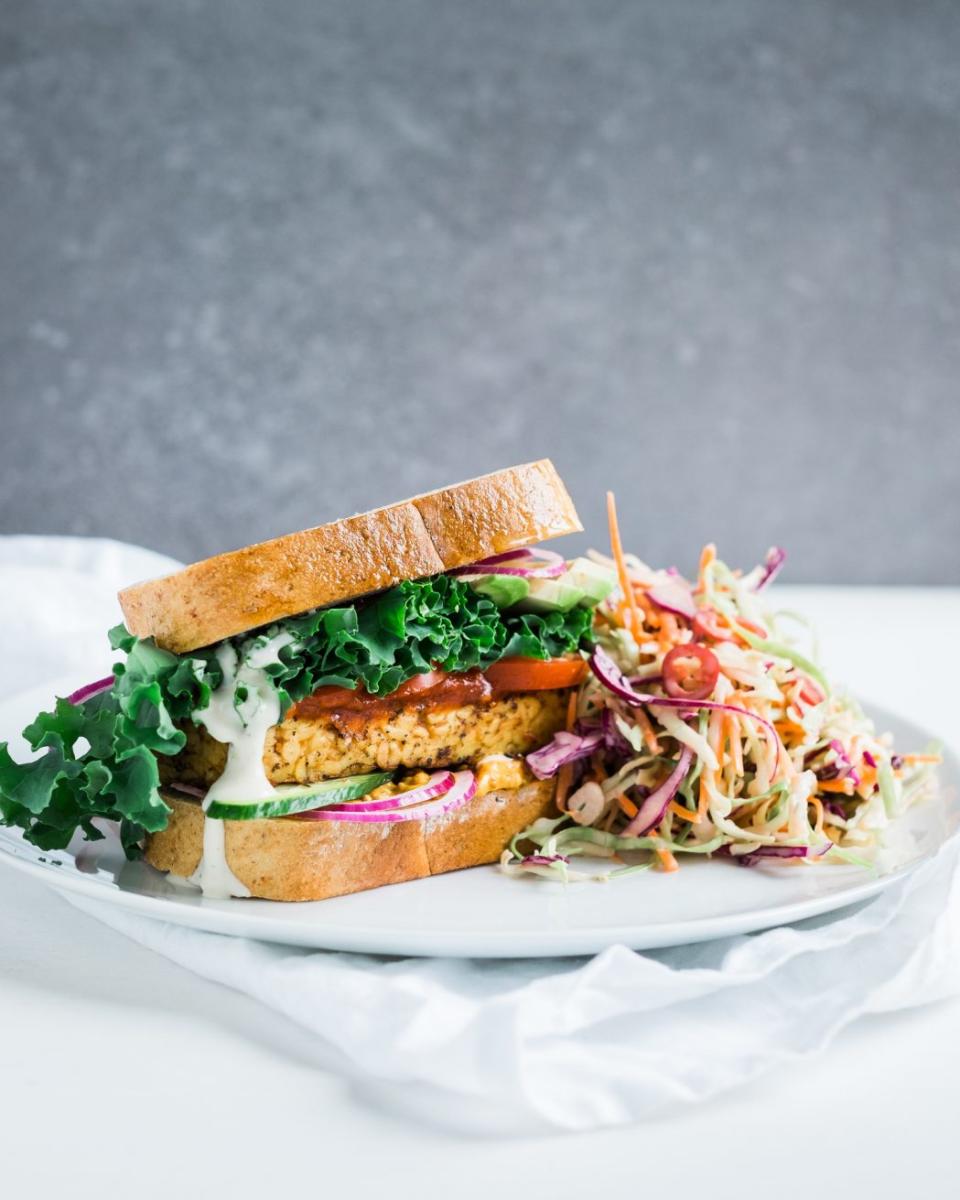Are Impossible Burgers and other alternative meats actually healthy? Experts weigh in
This is Trendland, your go-to encyclopedia of the latest trends in the wellness and self-care space. Once a month, we’ll be connecting with experts to take a deep dive into this buzzy world, tackling specific products, procedures, and trends. From IV therapy to ear seeds, we’ll get to the bottom of what each trend is about, who it’s meant for, and if it’s actually safe. Because while something might be trending, that doesn’t always mean it’s worth exploring.
Even if you’re not a vegetarian, there’s a good chance you’ve heard of the Impossible Burger. While some high-end restaurants offer the alternative-meat patty option that inconceivably tastes like real, flavorful meat, Burger King is largely responsible for making the name known near and far. And hey, we get it—with ads touting “real customer” feedback applauding the flavor and texture of the burgers, it’s no wonder the patties have gone viral. But it’s more than just clever advertising and tasty fast food.
To better understand the trendy nature of Impossible Burgers and other vegetarian meat substitutes, we chatted with two of New York’s top dietitians for the 411 on all things alternative-meat. Find out what they have to say, below.
What is alternative-meat?
In short, it’s any meat that’s, well, not actually meat. While most people assume meat alternatives to be the biggest hit among vegetarians, nowadays, innovative seasoning makes alternative-meat a people-pleaser among traditional meat lovers, too.
According to clinical and culinary registered dietitian Jennifer Maeng of Chelsea Nutrition, alternative-meat is typically made with pea protein or soy protein to make the products equally as protein-rich as traditional meat (for instance, the Impossible Burger has 19 grams of protein, equal to an identical serving of ground beef). However, she notes that to make soy or pea similar in textures and flavors to meat, alternative-meat manufacturers often have to add a lot of additives and other ingredients such as thickeners, oils, and artificial (or natural) flavors.
Registered dietician and founder of Real Nutrition Amy Shapiro tacks onto this, noting that many alternative-meats are also made with nuts, seeds, grains, seitan, and mushrooms—some of which have ample amounts of protein and healthy fats.

Is alternative-meat safe?
Think about it: Eating grain-, nut-, and veggie-based products aren’t going to cause you any harm (unless, of course, you’re allergic to those ingredients). However, just because alternative-meat is safe to eat doesn’t mean it’s necessarily the most nutritious choice (more on that below). That’s because, unless you’re consciously supplementing your diet with vitamins and minerals, you could miss out on essential nutrients found in real meat. Not to mention the fact that if you opt for a soy-based alternative-meat product, there’s a chance you may experience hormonal side effects.
That said, Maeng points out that alternative-meat is a great option for anyone trying to transition from a carnivorous diet to one based in plants, but it’s not a be-all, end-all solution.
Is alternative-meat healthier than regular meat?
Here’s where things get tricky. Although meat alternatives have a healthy image, Maeng explains that they are still highly-processed foods that are high in sodium, not to mention, they have genetically-modified ingredients and highly-processed ingredients such as soy protein concentrate, canola oil, and safflower oil. Because of this, Shapiro reminds us that alternative-meat products are safe and healthy in moderation, but eating them as your main source of protein isn’t necessarily a good thing. “These items can be full of fillers, so it is important to read labels and know what you are eating,” she says.
But remember, as with most foods, alternative-meat nutrition differs from product to product.
undefined
Why is alternative-meat trending?
First, meatless protein products are better for the environment (which is why not only food manufacturers but mega-brands like PopSockets are going vegan). According to Shapiro, alternative-meat is a healthier environmental choice since plants leave less of a carbon footprint than animals.
Then there’s the fact that, for the first time ever, alternative-meat offers vegetarian options that taste and feel like actual meat.
undefined
While alternative-meat that tastes, feels, and looks like meat might make for a viral social media moment, Maeng has a good point: Most vegans and vegetarians aren’t as impressed by fake meat that bleeds like a real cow’s meat. That said, this new category of vegetarian protein is more so geared towards meat-eaters who are looking for a greener protein source or are newly-transitioned vegetarians.

The Takeaway
At the end of the day, alternative-meat is another trend that should be consumed with a grain of salt. “Plant-based meat might be better for the environment (only using a fraction of the land, water, and energy needed to raise livestock and emitting less greenhouse gas emissions) but when it comes to health, what you need to think about is how many of these products you are consuming on a daily and weekly basis,” Maeng concludes.
Shapiro adds by noting that clean animal proteins from grass-fed, organic, local, and responsibly-raised animals can be a healthy addition to a person’s diet (if they prefer not to be a vegetarian). Though, if you’re looking for a substitute, it’s best to select vegetarian products made of foods you can pronounce. Since some alternative meats are made with highly-processed ingredients, it’s important to keep a keen eye on labels when shopping for this buzzy protein source.

